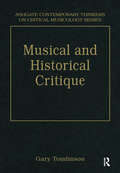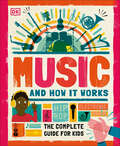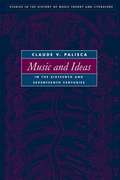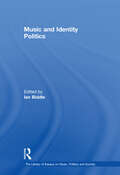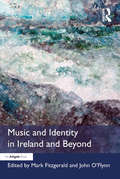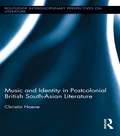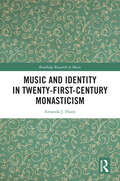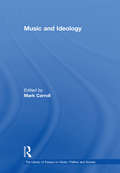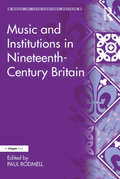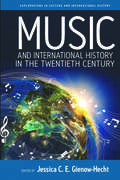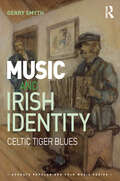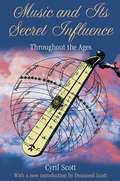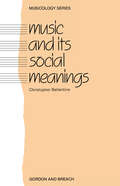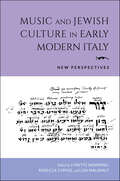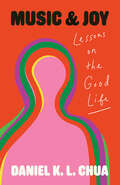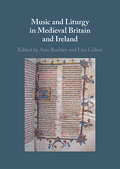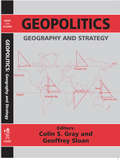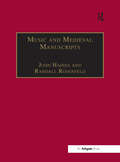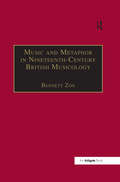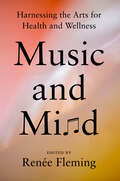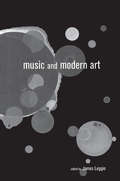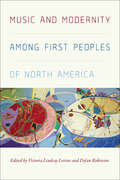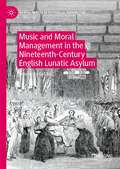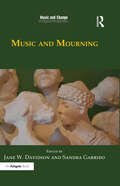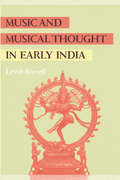- Table View
- List View
Music and Historical Critique: Selected Essays (Ashgate Contemporary Thinkers On Critical Musicology Ser.)
by Gary TomlinsonMusic and Historical Critique provides a definitive collection of Gary Tomlinson's influential studies on critical musicology, with the watchword throughout being history. This collection gathers his most innovative essays and lectures, some of them published here for the first time, along with an introduction outlining the context of the contributions and commenting on their aims and significance. Music and Historical Critique provides a retrospective view of the author's achievements in bringing to the heart of musicological discourse both deep-seated experiences of the past and meditations on the historian's ways of understanding them.
Music and How it Works: The Complete Guide for Kids (How it Works)
by DKTake a visual journey through the world of music and learn the science behind it, too.Budding music fans will love discovering musical geniuses of every era, from Mozart and classical music to Bowie and pop, as well as finding out how music is created and what links it all together.The book looks at music throughout history, beginning with the first known melody from the Fertile Crescent and covering modern music phenomena, from K Pop to hip-hop. Instruments and genres from across the world are featured, with "playlists" of key pieces encouraging kids to look up pieces to hear for themselves. STEAM spreads delve into the psychology and math behind music, from how it affects our mood to how it can improve our minds. Covering India's Ragas, Indonesia's Gamelan, Japan's city pop, and more, this book will help children discover a love of music.
Music and Ideas in the Sixteenth and Seventeenth Centuries
by Claude V. Palisca Thomas J. MathiesenDuring the great upheavals in the sixteenth and seventeenth centuries, Europe was divided over ideas about religion, science, education, economy, and government. The Church fought the Reformation, scholars formed into competing universities, and trade became increasingly internationalized. Musicians and musicologists of the time could not ignore the contending factions, and the general ferment of ideas ran parallel to thinking about music, as well as strongly affecting its practical composition and performance. As a result, the sixteenth and seventeenth centuries present a special opportunity to study the relationship between music and ideas. Music and Ideas in the Sixteenth and Seventeenth Centuries shows Claude V. Palisca--one of the preeminent musicologists of our time--at the height of his powers, discussing the relationships between musical style and intellectual history, the influence of humanism on the revival of music theory, the competing notions of style, and the intermingled effects of rhetoric, poetics, religion, and science. Palisca's discussions demonstrate how this period's musical thought was penetrated by many aspects of culture, including religious reform, secularization, the emergence of vernacular literature, documentary historiography, the rise and decline of neo-Platonism, Aristotelian poetics, the scientific movement, the revival of rhetoric, and openness to emotional experience. This summation of Palisca's life work was nearly finished in 2001, when Palisca died. It was brought to completion by Thomas J. Mathiesen.
Music and Identity Politics: Between The Global And The Local (The\library Of Essays On Music, Politics And Society Ser.)
by Ian BiddleThis volume brings together for the first time book chapters, articles and position pieces from the debates on music and identity, which seek to answer classic questions such as: how has music shaped the ways in which we understand our identities and those of others? In what ways has scholarly writing about music dealt with identity politics since the Second World War? Both classic and more recent contributions are included, as well as material on related issues such as music's role as a resource in making and performing identities and music scholarship's ambivalent relationship with scholarly activism and identity politics. The essays approach the music-identity relationship from a wide range of methodological perspectives, ranging from critical historiography and archival studies, psychoanalysis, gender and sexuality studies, to ethnography and anthropology, and social and cultural theories drawn from sociology; and from continental philosophy and Marxist theories of class to a range of globalization theories. The collection draws on the work of Anglophone scholars from all over the globe, and deals with a wide range of musics and cultures, from the Americas, Australasia, Europe, the Middle East and Africa. This unique collection of key texts, which deal not just with questions of gender, sexuality and race, but also with other socially-mediated identities such as social class, disability, national identity and accounts and analyses of inter-group encounters, is an invaluable resource for music scholars and researchers and those working in any discipline that deals with identity or identity politics.
Music and Identity in Ireland and Beyond
by Mark Fitzgerald John O'FlynnMusic and Identity in Ireland and Beyond represents the first interdisciplinary volume of chapters on an intricate cultural field that can be experienced and interpreted in manifold ways, whether in Ireland (The Republic of Ireland and/or Northern Ireland), among its diaspora(s), or further afield. While each contributor addresses particular themes viewed from discrete perspectives, collectively the book contemplates whether ’music in Ireland’ can be regarded as one interrelated plane of cultural and/or national identity, given the various conceptions and contexts of both Ireland (geographical, political, diasporic, mythical) and Music (including a proliferation of practices and genres) that give rise to multiple sites of identification. Arranged in the relatively distinct yet interweaving parts of ’Historical Perspectives’, ’Recent and Contemporary Production’ and ’Cultural Explorations’, its various chapters act to juxtapose the socio-historical distinctions between the major style categories most typically associated with music in Ireland - traditional, classical and popular - and to explore a range of dialectical relationships between these musical styles in matters pertaining to national and cultural identity. The book includes a number of chapters that examine various movements (and ’moments’) of traditional music revival from the late eighteenth century to the present day, as well as chapters that tease out various issues of national identity pertaining to individual composers/performers (art music, popular music) and their audiences. Many chapters in the volume consider mediating influences (infrastructural, technological, political) and/or social categories (class, gender, religion, ethnicity, race, age) in the interpretation of music production and consumption. Performers and composers discussed include U2, Raymond Deane, Afro-Celt Sound System, E.J. Moeran, Séamus Ennis, Kevin O’Connell, Stiff Little Fingers, Frederick May, Arnold
Music and Identity in Postcolonial British South-Asian Literature (Routledge Interdisciplinary Perspectives on Literature)
by Christin HoeneThis book examines the role of music in British-South Asian postcolonial literature, asking how music relates to the construction of postcolonial identity. It focuses on novels that explore the postcolonial condition in India, Pakistan, and the United Kingdom: Vikram Seth's A Suitable Boy, Amit Chaudhuri's Afternoon Raag, Suhayl Saadi's Psychoraag, Hanif Kureishi's The Buddha of Suburbia and The Black Album, and Salman Rushdie's The Ground Beneath Her Feet, with reference to other texts, such as E.M. Forster's A Passage to India and Vikram Seth's An Equal Music. The analyzed novels feature different kinds of music, from Indian classical to non-classical traditions, and from Western classical music to pop music and rock 'n' roll. Music is depicted as a cultural artifact and as a purely aestheticized art form at the same time. As a cultural artifact, music derives meaning from its socio-cultural context of production and serves as a frame of reference to explore postcolonial identities on their own terms. As purely aesthetic art, music escapes its contextual meaning. The transgressive qualities of music render it capable of expressing identities irrespective of origin and politics of location. Thereby, music in the novels marks a very productive space to imagine the postcolonial nation and to rewrite imperial history, to express the cultural hybridity of characters in-between nations, to analyze the state of the nation and life in the multicultural diaspora of contemporary Great Britain, and to explore the ramifications of cultural globalization versus cultural imperialism. It will be a useful research and teaching tool for those interested in postcolonial literature, music studies, cultural studies, contemporary literature and South-Asian literature.
Music and Identity in Twenty-First-Century Monasticism (Routledge Research in Music)
by Amanda J. HasteTwenty-first-century monastic communities represent unique social environments in which music plays an integral part. This book examines the role of music in Catholic, Anglican/Episcopalian and neo-monastic communities in Britain and North America, engaging closely with communities of practice to provide a penetrating insight into the role of music in self-care and as a vector for identity construction on both individual and community levels. The author explores the essential role of music in community dynamics, the rationale for using instruments, the implications of both chant-based and freestyle composition, gender-related differences in musical activity, the role of dance (‘music made visible’) in community life, the commodification of monastic music, the ‘Singing Nun’ phenomenon and the role of music in established and emerging neo-monastic communities. The result is a comprehensive and compelling study of the agency of music in the construction and expression of personal and community identity.
Music and Ideology (The\library Of Essays On Music, Politics And Society Ser. #18)
by Mark CarrollThis volume gathers together a cross-section of essays and book chapters dealing with the ways in which musicians and their music have been pressed into the service of political, nationalist and racial ideologies. Arranged chronologically according to their subject matter, the selections cover Western and non-Western musics, as well as art and popular musics, from the eighteenth century to the present day. The introduction features detailed commentaries on sources beyond those included in the volume, and as such provides an invaluable and comprehensive reading list for researchers and educators alike. The volume brings together for the first time seminal articles written by leading scholars, and presents them in such a way as to contribute significantly to our understanding of the use and abuse of music for ideological ends.
Music and Institutions in Nineteenth-Century Britain (Music in Nineteenth-Century Britain)
by Paul RodmellIn nineteenth-century British society music and musicians were organized as they had never been before. This organization was manifested, in part, by the introduction of music into powerful institutions, both out of belief in music's inherently beneficial properties, and also to promote music occupations and professions in society at large. This book provides a representative and varied sample of the interactions between music and organizations in various locations in the nineteenth-century British Empire, exploring not only how and why music was institutionalized, but also how and why institutions became 'musicalized'. Individual essays explore amateur societies that promoted music-making; institutions that played host to music-making groups, both amateur and professional; music in diverse educational institutions; and the relationships between music and what might be referred to as the 'institutions of state'. Through all of the essays runs the theme of the various ways in which institutions of varying formality and rigidity interacted with music and musicians, and the mutual benefit and exploitation that resulted from that interaction.
Music and International History in the Twentieth Century
by Jessica C. E. Gienow-HechtBringing together scholars from the fields of musicology and international history, this book investigates the significance of music to foreign relations, and how it affected the interaction of nations since the late 19th century. For more than a century, both state and non-state actors have sought to employ sound and harmony to influence allies and enemies, resolve conflicts, and export their own culture around the world. This book asks how we can understand music as an instrument of power and influence, and how the cultural encounters fostered by music changes our ideas about international history.
Music and Irish Identity: Celtic Tiger Blues (Ashgate Popular and Folk Music Series)
by Gerry SmythMusic and Irish Identity represents the latest stage in a life-long project for Gerry Smyth, focusing here on the ways in which music engages with particular aspects of Irish identity. The nature of popular music and the Irish identity it supposedly articulates have both undergone profound change in recent years: the first as a result of technological and wider industrial changes in the organisation and dissemination of music as seen, for example, with digital platforms such as YouTube, Spotify and iTunes. A second factor has been Ireland’s spectacular fall from economic grace after the demise of the "Celtic Tiger", and the ensuing crisis of national identity. Smyth argues that if, as the stereotypical association would have it, the Irish have always been a musical race, then that association needs re-examination in the light of developments in relation to both cultural practice and political identity. This book contributes to that process through a series of related case studies that are both scholarly and accessible. Some of the principal ideas broached in the text include the (re-)establishment of music as a key object of Irish cultural studies; the theoretical limitations of traditional musicology; the development of new methodologies specifically designed to address the demands of Irish music in all its aspects; and the impact of economic austerity on musical negotiations of Irish identity. The book will be of seminal importance to all those interested in popular music, cultural studies and the wider fate of Ireland in the twenty-first century.
Music and Its Secret Influence: Throughout the Ages
by Cyril Scott Desmond ScottThe role of music in the evolution of humanity • Reveals how a hierarchy of initiates, evolved spiritual intelligences, and devas actively influenced the musical compositions of geniuses to transmit great truths through music • Explores the influence of the classical composers Bach, Handel, Beethoven, Mendelssohn, Chopin, Schumann, Wagner, and Strauss--from Beethoven’s influence on the creation of psychoanalysis to Chopin’s musical influence on the emancipation of women Composer and author Cyril Scott explores the role of music in the evolution of humanity and shows how it has pushed human evolution forward. He explains that music has a profound effect on history, morals, and culture and is a more potent force in the molding of character than religious creeds or moral philosophies. Whereas mediocre musicians reflect only their own times, inspired ones help determine the character of the future. Exploring the works of classical composers such as Bach, Handel, Beethoven, Mendelssohn, Schumann, Chopin, Wagner, and Strauss, Scott reveals how their compositions were actively influenced by a hierarchy of initiates, evolved spiritual intelligences, and devas to make the way fertile for human spiritual evolution. Scott explains how humans are composed not only of a physical body, emotional body, and a mental body but also a sensation body that acts as the bridge between the physical realm and the hierarchy of initiates. Scott shows how the music of great composers affects not only those listening but also society as a whole--from Beethoven’s influence on the creation of psychoanalysis to Chopin’s musical influence on the emancipation of women.
Music and Its Social Meanings (Musicology #2)
by Christopher BallantineFirst Published in 1984. Routledge is an imprint of Taylor & Francis, an informa company.
Music and Jewish Culture in Early Modern Italy: New Perspectives (Music and the Early Modern Imagination)
by Lynette Bowring, Rebecca Cypess and Liza MalamutMusical culture in Jewish communities in early modern Italy was much more diverse than researchers originally thought. An interdisciplinary reassessment, Music and Jewish Culture in Early Modern Italy evaluates the social, cultural, political, economic, and religious circumstances that shaped this community, especially in light of the need to recognize individual experiences within minority populations. Contributors draw from rich materials, topics, and approaches as they explore the inherently diverse understandings of music in daily life, the many ways that Jewish communities conceived of music, and the reception of and responses to Jewish musical culture. Highlighting the multifaceted experience of music within Jewish communities, Music and Jewish Culture in Early Modern Italy sheds new light on the place of music in complex, previously misunderstood environments.
Music and Joy: Lessons on the Good Life
by Daniel K. ChuaFrom Confucius to Saint Augustine and Beethoven to the blues, a rediscovery of the joy that is music In this revelatory book, Daniel K. L. Chua asks a simple question: Is music joy? For Chua, the answer is a resounding yes—music is a lesson in joy that teaches us how to live well. But to hear this ancient knowledge, he says, we have to attend to a music that is so much greater than our greatest hits. Drawing on extensive sources, from the Confucian classics to the writings of Saint Augustine, Chua&’s book is a globe‑trotting, time‑traveling, mind‑boggling journey to rediscover the joy that is music. Using examples from Beethoven to the blues and from philosophy and theology to music theory, Chua updates the relation between music and joy and argues for its relevance in the face of our many political and environmental crises. He opens our ears to a music that is the very definition of joy for today&’s troubled world.
Music and Liturgy in Medieval Britain and Ireland
by Lisa Colton Ann BuckleyFrom music written in praise of Irish, Scottish, Welsh, and English saints to the selection of Gospel readings by the Dominicans, this book introduces readers to the richness of medieval liturgical culture from across Britain and Ireland. Each of its three main sections opens with a chapter that offers a contextual frame for its key themes. With contributions from leading experts in pre-Reformation music and its sources, the book's focus on Insular liturgy – rather than that of only one part of Britain or Ireland – allows readers to learn about the devotional, political and creative networks at play in shaping liturgical practices: personal, secular, monastic, lay, and professional. The opening part includes broader discussions of Uses, including that of Salisbury, and case studies explore Insular witnesses to devotional activities in honour of both local cults and widely known figures, including St Columba, St Margaret, St Katherine, and the Magi.
Music and Marx: Ideas, Practice, Politics (Critical and Cultural Musicology)
by Regula Burckhardt QureshiFirst Published in 2002. Routledge is an imprint of Taylor & Francis, an informa company.
Music and Medieval Manuscripts: Paleography and Performance
by Randall RosenfeldThe interdisciplinary approach of Music and Medieval Manuscripts is modeled on the work of the scholar to whom the book is dedicated. Professor Andrew Hughes is recognized internationally for his work on medieval manuscripts, combining the areas of paleography, performance, liturgy and music. All these areas of research are represented in this collection with an emphasis on the continuity between the physical characteristics of medieval manuscripts and their different uses. Albert Derolez provides a landmark and controversial essay on the origins of pre-humanistic script, while Margaret Bent proposes a new interpretation of a famous passage from a fifteenth-century poem by Martin Le Franc. Timothy McGee contributes an innovative essay on late-medieval music, text and rhetoric. David Hiley discusses musical changes and variation in the offices of a major saint‘s feast, and Craig Wright presents an original study of Guillaume Dufay. Jan Ziolkowski treats the topic of neumed classics, an under-explored aspect of the history of medieval pedagogy and the transmission of texts. The essays that comprise this volume offer a unique focus on medieval manuscripts from a wide range of perspectives, and will appeal to musicologists and medievalists alike.
Music and Metaphor in Nineteenth-Century British Musicology (Music In Nineteenth-century Britain Ser.)
by Bennett Zon�In a word, I shall endeavour to show how our music, having been originally a shell-fish, with its restrictive skeleton on the outside and no soul within, has been developed by the inevitable laws of evolution, through natural selection and the survival of the fittest, into something human, even divine, with the strong, logical skeleton of its science inside, the fair flesh of God-given beauty outside, and the whole, like man himself, animated by a celestial, eternal spirit....� W.J. Henderson, The Story of Music (1889) Critical writing about music and music history in nineteenth-century Britain was permeated with metaphor and analogy. Music and Metaphor examines how over-arching theories of music history were affected by reference to various figurative linguistic templates adopted from other disciplines such as art, religion, politics and science. Each section of the book discusses a wide range of musicological writings and their correspondence with the language used to convey contemporary ideas such as the sublime, the ancient and modern debate, and, in particular, the theory of evolution. Bennett Zon reveals that through their application of metaphorical frameworks taken from art, religion and science, these writers and their work shed light on nineteenth-century perceptions of music history and illuminate the ways in which these disciplines affected notions of musical development.
Music and Mind: Harnessing the Arts for Health and Wellness
by Edited by Renée Fleming"This book inspires us all to immerse ourselves in the vast potential of music and other creative arts to heal our wounds, sharpen our minds, enliven our bodies, and restore our broken connections.&” —Bessel van der Kolk, #1 New York Times bestselling author of The Body Keeps the ScoreWorld-renowned soprano and arts/health advocate Renée Fleming curates a collection of essays from leading scientists, artists, creative arts therapists, educators, and healthcare providers about the powerful impacts of music and the arts on health and the human experienceChapters include: Ann Patchett, &“How to Fall in Love with Opera&” Yo-Yo Ma, &“Nature, Culture, and Healing&”Aniruddh D. Patel, &“Musicality, Evolution, and Animal Responses to Music&”Richard Powers, &“The Parting Glass"Daniel J. Levitin, &“What Does It Mean to be Musical?&” Anna Deavere Smith, &“Healing Arts&” Rosanne Cash, &“Rabbit Hole&” Rhiannon Giddens, &“How Music Shows Us What It Means to Be Human&”Robert Zatorre, &“Musical Enjoyment and the Reward Circuits of the Brain&”Concetta Tomaino, &“Music and Memory&”A compelling and growing body of research has shown music and arts therapies to be effective tools for addressing a widening array of conditions, from providing pain relief andalleviating anxiety and depression to regaining speech after stroke or traumatic brain injury, and improving mobility for people with disorders that include Parkinson&’s disease and MS.In Music and Mind Renée Fleming draws upon her own experience as an advocate to showcase the breadth of this booming field, inviting leading experts to share their discoveries. In addition to describing therapeutic benefits, the book explores evolution, brain function, childhood development, and technology as applied to arts and health.Much of this area of study is relatively new, made possible by recent advances in brain imaging, and supported by theNational Institutes of Health, major hospitals, and universities. This work is sparking an explosion of public interest in the arts and health sector.Fleming has presented on this material in over fifty cities across North America, Europe, and Asia, collaborating with leading researchers, policy-makers, and practitioners. With essays from notable musicians, writers, and artists, as well as leading neuroscientists, Music and Mind is a groundbreaking book, the perfect introduction and overview of this exciting new field.
Music and Modern Art (Border Crossings)
by James LeggioMusic and Modern Art adopts an interdisciplinary approach to the relationship between these two fields of creative endeavor.
Music and Modernity among First Peoples of North America (Music / Culture Ser.)
by Victoria Lindsay Levine Dylan RobinsonMusic and Modernity among First Peoples of North America is a collaboration between Indigenous and settler scholars from both Canada and the United States. The contributors explore the intersections between music, modernity, and Indigeneity in essays addressing topics that range from hip-hop to powwow, and television soundtracks of Native Classical and experimental music. Working from the shared premise that multiple modernities exist for Indigenous peoples, the authors seek to understand contemporary musical expression from Native perspectives and to decolonize the study of Native American/First Nations music. The essays coalesce around four main themes: innovative technology, identity formation and self-representation, political activism, and translocal musical exchange. Closely related topics include cosmopolitanism, hybridity, alliance studies, code-switching, and ontologies of sound. Featuring the work of both established and emerging scholars, the collection demonstrates the centrality of music in communicating the complex, diverse lived experience of Indigenous North Americans in the twenty-first century and brings ethnomusicology into dialogue with critical Indigenous studies.
Music and Moral Management in the Nineteenth-Century English Lunatic Asylum (Mental Health in Historical Perspective)
by Rosemary GoldingThis book traces the role played by music within asylums, the participation of staff and patients in musical activity, and the links drawn between music, health, and wellbeing. In the first part of the book, the author draws on a wide range of sources to investigate the debates around moral management, entertainment, and music for patients, as well as the wider context of music and mental health. In the second part, a series of case studies bring to life the characters and contexts involved in asylum music, selected from a range of public and private institutions. From asylum bands to chapel choirs, smoking concerts to orchestras, the rich variety of musical activity presents new perspectives on music in everyday life. Aspects such as employment practices, musicians’ networks and the purchase and maintenance of musical instruments illuminate the ‘business’ of music as part of moral management. As a source of entertainment and occupation, a means of solace and self-control, and as a device for social gatherings and contact with the outside world, the place of music in the asylum offers valuable insight into its uses and meanings in nineteenth-century England.
Music and Mourning (Music and Change: Ecological Perspectives)
by Sandra Garrido Jane W. DavidsonWhile grief is suffered in all cultures, it is expressed differently all over the world in accordance with local customs and beliefs. Music has been associated with the healing of grief for many centuries, with Homer prescribing music as an antidote to sorrow as early as the 7th Century BC. The changing role of music in expressions of grief and mourning throughout history and in different cultures reflects the changing attitudes of society towards life and death itself. This volume investigates the role of music in mourning rituals across time and culture, discussing the subject from the multiple perspectives of music history, music psychology, ethnomusicology and music therapy.
Music and Musical Thought in Early India (Chicago Studies In Ethnomusicology Ser.)
by Lewis RowellOffering a broad perspective of the philosophy, theory, and aesthetics of early Indian music and musical ideology, this study makes a unique contribution to our knowledge of the ancient foundations of India's musical culture. Lewis Rowell reconstructs the tunings, scales, modes, rhythms, gestures, formal patterns, and genres of Indian music from Vedic times to the thirteenth century, presenting not so much a history as a thematic analysis and interpretation of India's magnificent musical heritage. In Indian culture, music forms an integral part of a broad framework of ideas that includes philosophy, cosmology, religion, literature, and science. Rowell works with the known theoretical treatises and the oral tradition in an effort to place the technical details of musical practice in their full cultural context. Many quotations from the original Sanskrit appear here in English translation for the first time, and the necessary technical information is presented in terms accessible to the nonspecialist. These features, combined with Rowell's glossary of Sanskrit terms and extensive bibliography, make Music and Musical Thought in Early India an excellent introduction for the general reader and an indispensable reference for ethnomusicologists, historical musicologists, music theorists, and Indologists.
